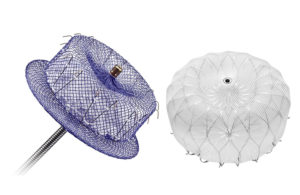
Left atrial appendage occlusion (LAAO) devices on the market include Abbott’s Amplatzer Amulet (left) and Boston Scientific’s Watchman (right). [Images courtesy of Abbott and Boston Scientific]
In a letter to health care providers, the FDA said researchers have yet to determine the reason for the difference — and that it is working with device makers to understand the cause.
For now, FDA officials still think that the benefits outweigh the risks when it comes to using LAAO devices such as Abbott’s Amplatzer Amulet and Boston Scientific’s Watchman and Watchman FLX to prevent people with atrial fibrillation from experiencing strokes.
The FDA advised health providers to continue monitoring people with LAAO devices, discussing risks and benefits, and reporting any adverse events.
The letter to health care providers comes after an analysis of real-world data in the National Cardiovascular Data Registry LAAO Registry from 49,357 patients (41.3% women and 58.7% men) undergoing LAAO procedures from 2016 to 2019. The researchers from UC San Diego, Yale University, and other U.S. and Canadian institutions found that 6.3% of the women experienced adverse events versus 3.9% of the men.
There were also differences between women and men when it came to major adverse events (4.1% versus 2.0%) and hospital stays longer than one day (16.0% versus 11.6%).
FDA officials acknowledged the limitations of the study, published in the August 11 edition of JAMA Cardiology. The data only involved one device — the first-generation Watchman — and it was not randomized or including longer-term outcomes beyond in-hospital events. But the FDA added: “The analysis provides results from a large registry of patients treated with LAAO implants in the U.S.”
In a statement shared by a spokesperson, Boston Scientific said it “welcomes additional clinical research designed to improve the treatment of patients with non-valvular atrial fibrillation, and encourages deeper understanding of these findings within important context.”
Boston Scientific said clinical evidence has shown a positive risk-benefit balance in both women and men when it comes to Watchman technology. “Meta-analysis of pooled 5-year data from the Protect AF and Prevail clinical trials showed that relative efficacy of the legacy Watchman device … versus oral anticoagulation was similar in women and men.”
Abbott in a statement acknowledged that understanding the potential differences in treatment effects between men and women is an important part of ensuring all patients receive effective therapy. “Abbott has conducted two major clinical studies on our Amulet left atrial appendage closure device — our observational and IDE studies — and the resulting publications did not show differences in treatment effect or adverse events between men and women.”



